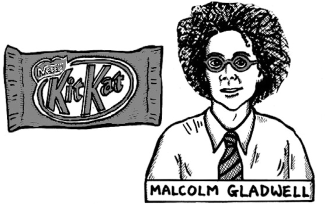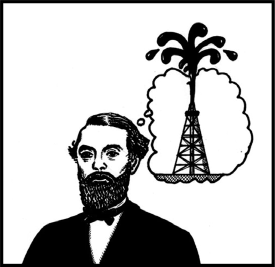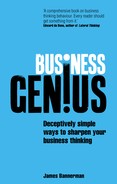The seventh Block and Limitation to Business Genius is negative impact.
And negative impact usually happens for two reasons:
- There’s not enough wham! (In other words, we make such a soft impression on others, we barely get noticed or remembered.)
- There’s too much wham! (In other words, we make such a hard impression on others, we do get noticed, and we do get remembered, but for all the wrong reasons.)
Positive impact is all about striking a healthy balance, so we strike into others in a strong, yet not over-strong, way.
Unfortunately, however, this can be tricky, because it’s not always easy to know how we do come across to other people.
In a business meeting, for example, we might think we’re being precise, but others might think we’re being picky; we might think we’re being silently attentive, but others might think we’re being aloof; or we might think we’ve got an amazing winning smile, but others might be grossed out by the spinach in our teeth.
Similarly, we don’t always know how impactful things can be.
Take the airline industry, for example. Recent research has shown that the number one threat to airline security is not terrorism, or mechanical error, but pilot tiredness. Evidently, the impact of a poor night’s sleep on a pilot’s concentration and decision making can be hugely significant.
Or consider the impact of the chocolate wafer bar KitKat in Japan. Purely by chance the name KitKat (which was an abbreviation of Christopher Catling – the owner of a pie shop in eighteenth-century England where the Kit-Kat Club used to meet) sparked massive commercial success in Japan because it sounds remarkably similar to kitto katsu, the Japanese phrase for ‘you will definitely succeed’.
Consequently, millions of Japanese not only buy KitKat chocolate bars as snacks, but also as gifts, too!
So if you aspire to UP! your impact, please be mindful of ‘how little things can make a big difference’ (as the impactful author Malcolm Gladwell surmises in his millennium bestseller, The Tipping Point: How little things can make a big difference).
One of the ‘little things’ Gladwell pointed out was how a ‘single, breakthrough insight’ – by the Business Genius Joan Ganz Cooney back in the 1960s – ended up having a massive impact on literacy levels around the world.
TV producer Cooney believed, ‘If you can hold the attention of children, you can educate them,’ and her Genius TV show Sesame Street went on to be living proof of that!
In the work you do, keep remembering that positive impact is as much about the micro as the macro, from the way you shake someone’s hand for the first time, to the way you look someone in the eye.
I was once told, for example, how a young recruit at a large bank lost their job because they wrote, ‘31 June’ on an important document. Why? Because there are clearly only 30 days in June, and this tiny error seriously undermined that bank’s credibility with one of their major clients.
On a more positive note, however, you may want to consider this.
One of the most impactful things you can ever do in business is say thank you (a genuine thank you) for a job well done. Research has shown, for example, that organisations with a ratio of positive feedback to negative feedback of 3:1 significantly outperform those where managerial praise and recognition is hard to come by, and where managerial criticism and fault-finding are day-to-day routine.
So, please bear in mind that – when it comes to impact – the world of work doesn’t have to be the immovable, implacable place we often assume it to be. As Gladwell writes: ‘With the slightest push – in just the right place – it can be tipped’…


UP! YOUR IMPACT
NUGGET
Most people have never heard of Edwin Drake.
Likewise, they’ve no idea why Sunday 28 August 1859 turned out to be one of the most impactful days in history!
The chain of events Drake set in motion that day, however, is simply mind-blowing. What did he do? Well, he used a little Genius thinking to come up with a new way of finding oil.
Evidently – according to author Stephen Howarth in his book A Century in Oil: The ‘Shell’ Transport and Trading Company 1897–1997 – before Drake it was assumed that the best way to extract oil involved digging pits or ‘skimming natural seepings from the surfaces of streams’.
In other words, it was assumed that oil couldn’t be obtained quickly, easily, or in ‘commercially viable quantities’; by contrast, it could be obtained only in small amounts, and very slowly, like patiently waiting for the sap to ooze out of trees.
Drake, however, who had originally worked on the railways, wondered what might happen if he drilled for oil. So, on that specific day in 1859, he used a rickety derrick in Pennsylvania to drill 69 feet down and … whoosh! He not only struck oil, but he kick-started the entire oil industry, which currently employs more people than any other industry on the planet!
Not only that. If we think of oil as ‘the great enabler’ – as Howarth describes it – it’s hard to think of a business that hasn’t been impacted upon by Drake’s breakthrough moment in some way. From planes, trains and automobiles to computers, dresses, skis, glasses, guitar strings, golf balls, crayons, ballpoint pens, deodorant, footballs, cameras, paint and even aspirin, oil is now used in over 6,000 different items!


USEFUL TIPS AND
ESCAPE STRATEGIES
If you’re eager to UP! your impact, here are three practical tips and strategies that can help:
1 ALWAYS START WELL
One of the biggest clichés of impact training courses is that, ‘You never get a second chance to make a first impression.’ Unfortunately, this strategic insight (which psychologists label ‘the primacy effect’) is all too true!
So, whether you’re an entrepreneur who’s about to make an ‘elevator pitch’ to potential investors, a new manager who’s about to say ‘hello’ to their new team, or a leader who’s about to deliver that uplifting keynote speech at the annual conference, make sure you get off to a great start.
This is because first impressions often have what Massachusetts Institute of Technology’s Edward Lorenz called ‘the butterfly effect’ (i.e. a ripple effect that starts as something minor – like the flapping of a butterfly’s wings – and ends up as something major, like a tidal wave on the far end of the world).
That’s not to say you automatically have to leap to the other extreme and make a grand entrance like Cleopatra (who famously emerged out of an unfurled carpet at the feet of Mark Antony when they met for the first time!); it simply means that, if you want to ‘impress your way to success’ (as Vickers, Banister and Smith would say), keep reminding yourself that Shakespeare was only half right when he wrote the immortal words ‘All’s well that ends well’ …
2 USE ‘LISTENING EYES’
One of the most effective ways of gauging the impact you have on others is simply to listen with your eyes. Or, to put it another way, don’t just listen to what people say, watch what they do, too.
If you’re giving a business presentation, for example, be alert to your audience’s non-verbal clues. If one person happens to yawn, for example, it could be they’re just tired after an exhausting inter-continental flight. If everyone’s yawning, though, there’s a good chance you’ll need to change gear, instantly!
Presentation skills experts call this ‘Hooking The Curtain Up’, and it’s vital if you want to deliver more impactful presentations.
All you have to do is something – anything – to help break the pattern! Gently clap your hands together to emphasise your point (which will wake them up a bit) or throw a prop in the air (without hurting anyone) or give your delegates a question to discuss with the person sitting next to them. Put simply, make a switch. Even walking to a different part of the stage can help, too.
By the way, remember to listen with your eyes at the end of a work engagement, too, because – when it comes to impact – it’s not so much what you take away with you that counts … it’s what you leave behind!
3 SHARPEN YOUR ‘BRAND’
Like it or not, every single one of us is a ‘brand’.
That’s to say, from the clothes we wear to the words we speak, we’re the human equivalent of a packet of Oreo cookies, Nike trainers, or perhaps even a red Ducati motorbike.
Winston Churchill’s bowler hat, for example, was an indispensable part of his image (as was his bow tie and cigar). Likewise, Psy – the South Korean pop star – used a highly original and impactful dance routine in his Gangnam Style video to help turn his song into the biggest YouTube hit ever (watched by over 2 billion viewers as of May 2014!). And, if you think about it, even knights in shining armour used to wear coats of arms because, with their helmets on, it was the only way soldiers on the battle field could tell them apart.
In this respect, keep asking yourself if your personal brand is as impactful as you need it to be (or, if not, what you could potentially do to sharpen your offering).
After all, as Jim Rohn – the Genius personal development guru – once said, if you want to make real progress in business, you’ve got to ‘work harder on yourself than you do at your job’. Likewise, it’s also why Tom Peters – the infamous co-author of In Search of Excellence – argues: ‘The only job security [in the modern world] is to make sure that you’re more valuable tomorrow, than you are today!’ So keep building your own brand, or rebrand yourself if necessary, so you stand out as a core competent.
Whilst we’re on the subject of personal branding, however, please bear in mind that successful brands are built upon trust. Or, as Ian Robertson – the head of sales and marketing at BMW – said in a recent TV interview: ‘What is a brand? A brand is essentially a promise. A promise of innovation, a promise of outstanding design, a promise of safety …’ So, whatever you do in business, be as authentic as you can be, because it’s often nigh on impossible to rescue a brand that’s gone toxic, because people won’t trust it any more.
Finally, here’s a fourth top tip (a bonus tip) to help you UP! your impact.
4 DECLUTTER YOUR MIND
It’s often said – by management consultancies such as Kepner-Tregoe – that ‘effective action follows clear thinking.’
So if it’s Business Genius impact you’re after, it’s important to remember that high impact in business is virtually impossible if our thinking is all over the place. Or, as Chris Brogan and Julien Smith – the authors of The Impact Equation – put it: ‘Are you making things happen, or just making a noise?’
Also, here’s a bit of golden advice that productivity expert David Allen suggests in his book Getting Things Done: ‘Use your mind to think about things, rather than of them.’
In other words, create a trusted system (of folders and lists) to help you get what’s on your mind, off your mind, in a systematic and organised way. That way you can create some sharper boundaries between your thoughts, much like the barbed wire that Business Genius and Illinois farmer Joseph Glidden invented in 1874.
Once again, it might sound blindingly obvious but the ability to clear your head is vital if you want to sharpen your business impact! After all, sharper thinking didn’t do Glidden much harm. He became one of the richest men in America on the back of it!

BUSINESS GENIUS IN ACTION:
NEXT STEPS …
In summary, if you want to UP! your impact, here’s how:
- Pinpoint where too much wham! stops, and not enough wham! begins (to help you ‘strike into’ others in a strong, yet not over-strong, way).
- Investigate how little things can often have a big impact (as we illustrated with KitKat in Japan, Cooney with Sesame Street and Edwin Drake with his ingenious idea of drilling for oil).
- Leverage the power of starting well (because, as we all know, we’ll never get a second chance to make a first impression).
- Orchestrate a plan for sharpening your personal brand (to ensure you get noticed, and remembered, for all the best reasons).
- Target clear thinking (so you can use your mind to think about things rather than of them, otherwise your thinking will end up cluttered, and you’ll simply make a noise rather than make things happen).

UP!SPIRATION
‘The only limit to your impact is your imagination and commitment.’
Tony Robbins (American life coach, self-help author and motivational speaker)
